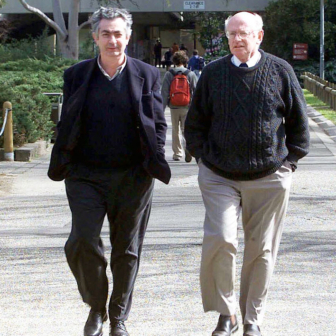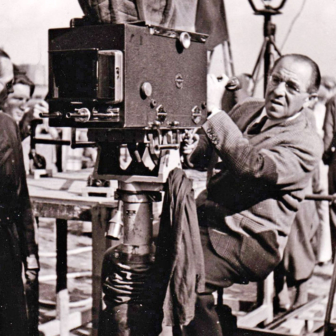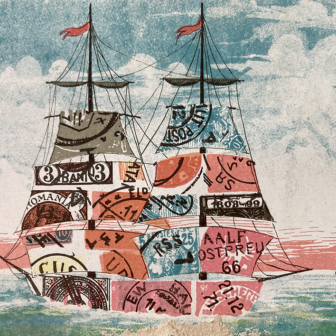Sick of negative political ads? Turned off by the screaming match that election advertising has become? Had enough scare campaigns about inflation and the cost of living? Thanks to the restoration of a remarkable collection of water-damaged gramophone records, more than sixty years old, you can now experience the political advertising your grandparents listened to. Make up your own mind if they enjoyed a higher level of electoral discourse than we do today.
A collection of thirteen gramophone records was recently exhumed from the University of Melbourne Archives. Damaged by dirt, water and sheer old age, the 33rpm discs were cleaned, conserved and digitised and are now on the archives’ website. That they can now be downloaded as MP3 files is a remarkable story of survival in itself. More than that: these rescued recordings plunge us back into one of Australia’s most important and innovative – and expensive – political advertising campaigns.
These are campaign advertisements, but not as we know them today. Broadcast on radio in 1948 and 1949, they formed part of the Liberal Party’s long-running campaign to weaken the Chifley Labor government. Adapting the popular format of a radio serial into a sort of political satire, the fifteen-minute broadcasts ran twice-weekly for about twenty months in the lead-up to the 1949 election campaign. In total, about 200 episodes went to air on more than eighty commercial radio stations in every state. Many of the scripts have survived, but the broadcasts themselves were believed lost until these gramophone records, containing twenty-two episodes, came to light. Their existence allows us to experience the complete aural environment of the original broadcasts – voices, accents, music, sound effects – and appraise once again a pioneering propaganda campaign that helped defeat Labor and install Robert Menzies as prime minister.
The star of the show – host, commentator and animating spirit – was “John Henry Austral.” Played by actor Richard Matthews, Austral is a complex figure. With his smooth voice, educated accent and cool cynicism about life under the Labor government, Austral is the embodiment of the Liberal Party’s political philosophy and values. To have a fictitious persona, rather than a politician, as party spokesman was itself unusual – indeed, Austral rarely endorsed or even named any Liberal politician. Instead, as his name suggests, Austral’s political affiliations arise from his national identity: his is the voice of common sense, home-spun wisdom and native morality; he speaks repeatedly of “your land – and mine”; and the show’s theme song is a soaring orchestral version of “Waltzing Matilda.” Austral’s accent is cultivated – he might be a solicitor or doctor, and like any professional he assumes that his client-audience will defer to his authority. But the effect is moderated by an easy Australian vernacular, and he seems careful not to speak down to, but to share his concerns with, his fellow-citizens, “lovers of democracy, lovers of Australia”:
The air is thick today with plans and blueprints for social reconstruction. In all walks of life there are enthusiasts with ready-made answers to all the questions. And “isms” are two a penny. But – healthy sign as this may be – it doesn’t itself mean that problems are solved. We can argue till we are blue in the face about the merits and demerits of a planned economy, bureaucratic controls, nationalisation of this or that. But we’ll never get away from the fact that development of any country depends at bottom on the character and outlook of its people.
That said, Austral is a determined and, to modern ears at least, slightly sinister propagandist. He pulls his punches against “the amiable Mr Chifley” and his predecessor, “the late John Curtin,” but unreservedly damns their “socialistic government,” with its “repressive officialdom,” “political oppression,” “regimentation” and affiliation “with a minority which owes its allegiance to a foreign, anti-British, anti-Australian power.” Most of the episodes end with what in marketing terms is his “call to action”: sometimes he invites listeners to write to him with their comments; more often he reminds them about the impending election:
We complain about high taxes – but keep electing the blokes who stand behind them. It’s time to stop grumbling and do something! Our opportunity is just around the corner. Let’s make the most of it!
Joining Austral is a diverse cast of characters who act out the daily dramas that are the principal stuff of these ads. The point of this campaign was to undermine confidence in the Labor government by illustrating the difficulties and anxieties of life under Chifley. Food prices were rising. Shoppers queued. Essential goods were still rationed through coupons, just as they had been during the war. A black market thrived, “dragging decent people down into the mud” and “degrading this land of ours – your land, and mine,” as Austral reminds us. Teenagers wasted their evenings. And somewhere not too far away, the communists were secretly plotting their revolution.
These themes were all deftly conveyed in little scenes: men discussing black-market whisky in a pub, wives chastising their husbands in the living room for going on strike, teenagers lounging on a street corner, shoppers quizzing shopkeepers about the groceries. Through clever use of accent and tone, the actors underline the political message. A soap-box speaker loudly condemns big business with a rich working-class accent: “Why should rich men loll in luxurious idleness while you toil and sweat?” His critic responds with the facts, in an upright, prim voice: “Big business is owned by small shareholders.” Austral asks us, “Who do you choose to believe: men of calibre or the ill-informed spielers of socialism?” The communist plotters, of course, all mutter and splutter in heavily accented (German? Russian?) tones, and call each other comrade with a capital-K.
And then there are the women. Almost without exception, the women characters are heard in the home or the shop. These are not income earners but mothers and wives. But it is precisely from these roles that, in Austral’s world, they derive practical wisdom and moral authority which in turn gives them a legitimate and in fact powerful political voice. Managing household budgets, they understand the impact of inflation; they are the “chief sufferers” of strikes because (they argue) such disputes cause price increases; raising children they understand education policy. In the privacy of the living room, they cajole and persuade their husbands with common sense and moderation – while reminding them not to drop ash on the carpet.
The political strategy is clear. John Henry Austral represented the middle class in all its solidity and anxiety. He speaks as they do, promotes their values, articulates their concerns and unflinchingly attacks those who threatened them: communists, indolent workers, and centralised planners in Canberra: “Unless we produce more and keep on saving our savings, all our over-centralised economic planning cannot save Australia from disastrous inflation!”
Six years before the Austral broadcasts, before the Liberal Party had been created and while the second world war still raged, another radio broadcast had invoked the middle class in a similar way. Former United Australia Party prime minister Robert Menzies, leading a fragmented and dispirited opposition, delivered his landmark statement of political values, “The Forgotten People”:
The time has come to say something of the forgotten class, the middle class, those people who are constantly in danger of being ground between the upper and nether millstones of the false class war; the middle class who, properly regarded, represent the backbone of this country… the kind of people I myself represent in parliament: salary-earners, shopkeepers, skilled artisans, professional men and women, farmers and so on.
As the political scientist Judith Brett has observed, although there is an attractive quality about Menzies’s praise for the family and the home-centred life and his defence of values beyond the material and utilitarian, it also has a hard unforgiving quality, a smug sanctimony and an authoritarian moralising reminiscent of a headmaster or vicar. Like “The Forgotten People,” the John Henry Austral series embodies a mix of inclusive and exclusive values, extolling a society made up not of classes or organisations, but of families in their homes and consumers in their shops; a society in which ideology shrinks before individual moral character; a society of freedoms rather than rights. Big business is nothing more than the small shareholders who own it, while organised labour is a collection of conscientious working Australians under the sway of union officials or organisers who are ignorant rabble-rousers, many of them communists.
Like Menzies’s broadcast, too, the John Henry Austral series constitutes a political strategy dressed as a disinterested statement about national interest – a party-political statement that does not mention parties. Where Menzies had spoken to the middle class in 1942 about the long term, John Henry Austral had an immediacy about his message to them, explicitly focusing their attention on the electoral opportunity which in 1948 lay just ahead of them. In one episode, Austral asks, “And who is the public?” His rhetorical question is met with an anthem of responses, the voices of the Forgotten People:
I, the housewife and the mother of a family.
I, the factory worker.
I, who work in an office, or nurse in a hospital.
I, the clerk – the bank teller – the man at a desk or a counter.
I, the school teacher – business executive – doctor – dentist – family man.
I, the man on the land, whether farmer, grazier or labourer.
I, the returned soldier.
I, the woman who also served.
I, the wharf labourer, miner, sleeper cutter, the trade unionist everywhere!
The political strategy behind these broadcasts is pursued relentlessly and consistently – but also with a light touch. Entertainment was a necessary path to instruction, and the audience gathered around the wireless sets was presented with diverse offerings of historical fare – such as pioneer stories about John Batman and John Forrest – as well as what we might think of as comedy sketches. To convey the impact of price rises, for example, Austral introduces a story about “the strange adventures of Mr William van Winkle.” This “highly respectable” man falls asleep in 1937 – only to wake up eleven years later. A kookaburra laughs at him as he struggles with his long beard and when he gets to the barber shop, he is astounded to find the cost of a haircut has risen; train fares and greengrocer prices have doubled as well. He tells his solicitors that he is living in a “nightmare” and, as they explain the modern economy, with its producer subsidies and black markets, they smoothly reassure him that we all get used to that feeling. Finally as he works out what has happened to him, Mr van Winkle tells anyone who will listen, “I’ve been asleep for ten years – but you’re all still asleep!”
In another elaborate story about rising prices or, as it was understood then, the falling value of the pound, Mrs Buyer goes shopping in 1908 in “Mr Golden Quid’s Emporium” (the series was strong on eponyms). She orders a long list of household goods. Mr Quid tells her the price of each – adding up columns of shillings and pence in a miraculous feat of mental arithmetic that gives a handy reminder to modern listeners about the virtues of decimal currency – and informs her that her basket of goods will cost seven shillings. But then, in a trick of time travel achieved through simple sound effects, Mrs Buyer is transported four decades into the present day, 1948. She walks into the same shop, “but imagine her surprise when, instead of the sovereign-like figure of Mr Golden Quid, she was confronted by a thin and weedy gentleman with a paper-like complexion and a green wrinkled look.”
This papery Mr Quid – modern listeners may need reminding that the £1 note was green in colour – is surly, his service is truculent and his prices strike Mrs Buyer as astronomical. Her basket of goods now costs – after more mental arithmetic – sixteen shillings and seven pence! And this includes coupons for the butter and the tea! Mrs Buyer cannot pay, so Mr Quid goes through her shopping and throws out most of her goods, including chopping the leg of lamb (now, mutton) in half right there on the counter. “There,” the new Mr Quid declares with malicious triumph, “is seven shillings of goods at present-day values. You can’t have been here for forty years – certainly not for the past eight” – that is, since Labor came to power.
Perhaps the strangest episode to modern ears is the one promoting the Liberal Party’s idea of funding community centres “for the advancement of culture and the awakening of public spiritedness among our younger men.” In this sketch, four young men meet after work and are bored: they do nothing more edgy than smoke cigarettes and go to the pictures. But the joke is that their fathers all fear they are up to mischief or, in the exasperated words of one of the lads, having “the odd spot of marijuana, or whatever they call it.” Later that evening, quizzed by his father, another one declares:
Well, I met the lads. First thing we did was to have a shot of cocaine all round. Then while Bill and Tom went off to one of those houses – you know – Dick and I went to the back door of the Trumpeters Arms and sank six double brandies in quick succession, prior to murdering a policeman and doing a couple of hold-ups. Then we went home.
This kind of humour is not what we expect in a political broadcast these days – whether from the Liberal Party or anyone else.
How these disc copies of the broadcasts survived is not entirely clear. Indeed, it’s not clear why they were made in the first place. They have lain undisturbed in the archives of the University of Melbourne and it is only recently that their unique status has been recognised; certainly no other major collecting library possesses anything like this. They were packaged (as this photo, courtesy of the University of Melbourne Archives, shows) for the post in Phillip Street Sydney, home of the Macquarie Broadcasting Network and its production arm Artransa, and addressed to station 2GN in Goulburn, New South Wales. It seems unlikely that the discs were distributed to every station for the original broadcast; perhaps this collection was assembled after the campaign was over and distributed in this more durable format. Even so, it is an odd sample, covering the first five episodes of the series, broadcast in February–March 1948 as well as a selection from much later, in 1949.
And did the discs ever reach Goulburn? A one-shilling railway freight stamp stuck on the package suggests they did. But at some point, somehow, they ended up with Richard Casey, federal president of the Liberal Party, and – according to another sticker on the package – he sent them off to London to an acquaintance, the prominent Australian businessman Sir Clive Baillieu. Casey and Baillieu had overlapped in Washington during the war, Casey as Australian ambassador and Baillieu as a British government representative on the purchasing commission. Perhaps the discs never made it to Goulburn, but were handed back to the Liberal Party whence Casey thought they would make interesting listening in London. After Baillieu died in 1967, the discs made their way back to Australia and were ultimately handed over, soiled and travel stained, to the archives which are accessible, after all, in the university’s Baillieu Library.
Dick Casey was the brains behind the Austral campaign. Gallipoli veteran, diplomat, member of parliament and then wartime governor of Bengal, he had tried unsuccessfully to return to politics via Liberal preselection for the new party’s first electoral contest in 1946. He settled for the federal presidency. A convert from his Washington days to the emerging practice of Public Relations, Casey saw merit in a series of radio talks that would run not during the election campaign but well before the campaign, aimed at shaping public opinion at the very time it was not actively focused on an electoral choice. Moreover, Casey turned out to be a brilliantly successful party fundraiser. Using his connections into the business community in Australia and London, and riding the tide of alarm at Chifley’s bank nationalisation plans, Casey raised huge sums – at least £250,000 – and could fund a lavish campaign. Precise figures are not possible, but the Canberra journalist Dick Whitington later reported claims that Casey had raised £1 million and had spent £800,000 on the 1949 campaign. Adjusted for inflation that is a campaign budget of $40 million in today’s terms, which would buy a very competitive quantity of market research, TV advertising and campaign websites.
Casey’s biggest contribution to the campaign, however, was poaching Labor’s entire advertising agency to run the Liberal campaign. South African born, Sim Rubensohn had successfully run his own commercial advertising agency in Sydney, the Hansen–Rubensohn Company, since the late 1920s. By the early 1930s he had won the account to manage political advertising for the state Labor Party and, in short order, for federal Labor as well. He was well connected, shrewd and good at his work. Advertising was a sometimes murky business: in a sensational court case in 1935, it emerged that Rubensohn had assisted police in arresting an advertising salesman, Douglas McConnell, in possession of a brown paper parcel containing 500 £1 notes, in Rubensohn’s own office. McConnell was charged with inciting Rubensohn to bribe an alderman of Sydney County Council to win the council’s advertising account; he was ultimately acquitted. Rubensohn’s advertising for the Labor Party had attracted the admiring attention of Menzies who, after the Liberals were defeated in their first federal election in 1946, bemoaned his party’s lack of a “clever set of advertising tradesmen at work in the centre” like Labor had. Salvation was near at hand, however: with bank nationalisation, Rubensohn split from federal Labor; when Casey heard of the row, he was quick to offer him the Liberal Party account.
It is not clear who was more shocked at the switch. Chifley, initially at least, accepted the departure of Labor’s ace with remarkable equanimity; the Liberal Party state branches, on the other hand, were nervous about taking on a new and unknown talent “at the centre” of the party and beyond the reach of their parochial interests. For Rubensohn’s part, the deal was irresistible. Like Casey, he was convinced of the political merits of a long-run radio series and believed he could not only knock over Chifley’s bank plans but perhaps also win lucrative concessions for his other clients from a new Liberal government. And he negotiated a 15 per cent commission on all campaign outlays. In a peculiar display of egotism or arrogance, Rubensohn took to illegally parking his luxury car in the street outside his city office; within three years he had racked up 183 parking fines.
If Rubensohn was the successful “suit,” then his “creative” was also critical to the success of the agency. Pip Cogger, an Englishman who had been wounded in Mesopotamia while serving with the Royal Field Artillery, had decided to switch to copywriting while convalescing in a London hospital in 1919. He made his way to New Zealand and thence to Sydney, telling journalist Gavin Souter in 1953 that he had served as “advocate-in-written words” for virtually everything “from the damnation of Communism to the deification of deodorants.” Rubensohn and Cogger were to switch back to Labor almost immediately after the Liberals’ 1949 triumph, and Rubensohn continued to manage Labor’s campaigns until finally eased out in 1974. But for now, Cogger had the task of crafting the mellifluous, ardent words of John Henry Austral and the varied dialogues of the shoppers, housekeepers, farmers and pioneers who populated his world.
IT SHOULD be pointed out, though it is perhaps obvious, that the John Henry Austral campaign was launched entirely without the benefit of market research. No focus groups were hurt in the development of the Liberals’ strategy. Nor was there any targeting of marginal seats. Aiming for the unconverted majority middle class was as targeted as things got in the 1940s, as the Liberal Party’s federal executive noted in early 1949:
Propaganda should not be designed to please those who will support us anyway. It need not waste time trying to wean diehard Labor supporters from their allegiance. It should be aimed at the greatly expanded middle class.
The John Henry Austral campaign should not be held up as some paragon of virtuous political communication. It played on emotions rather than the rational mind. It was deceptive in presenting its little dramatisations as factually accurate. It was negative in its own sly way. And Austral was as remorseless a propagandist as they come, wedging his opponents at every opportunity. But looking back at the campaign from the great distance of more than sixty years, and listening once more to these sounds, one significant merit is apparent. This advertising represented a concerted, extended effort to present voters with a coherent and complete worldview – a political philosophy. John Henry Austral was middle-class, market-based, anti-communist, anti-Canberra and nationalist because that was the view and ideal of the Liberal Party he represented. At a time when party campaign advertising has abandoned platforms to focus almost exclusively on manoeuvring over short-term issues and attacking the character of rival leaders, that is not a bad example to look back on. •




